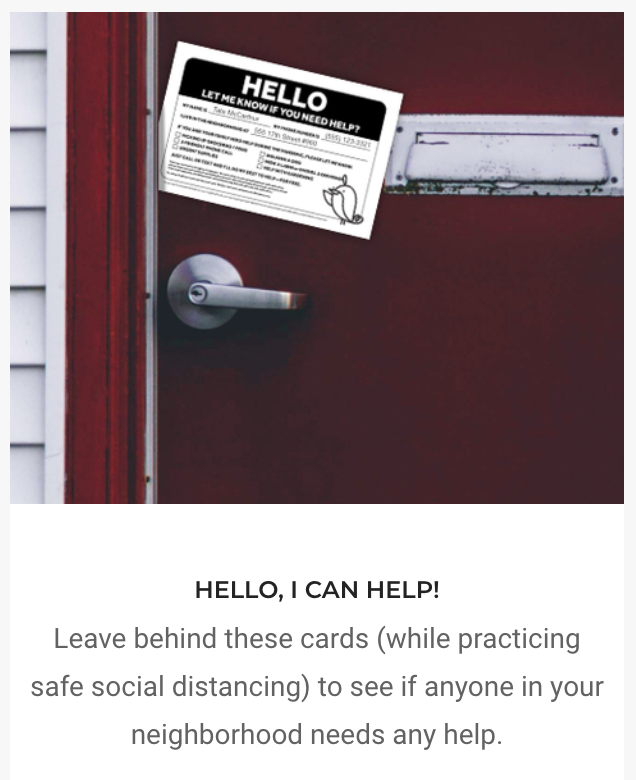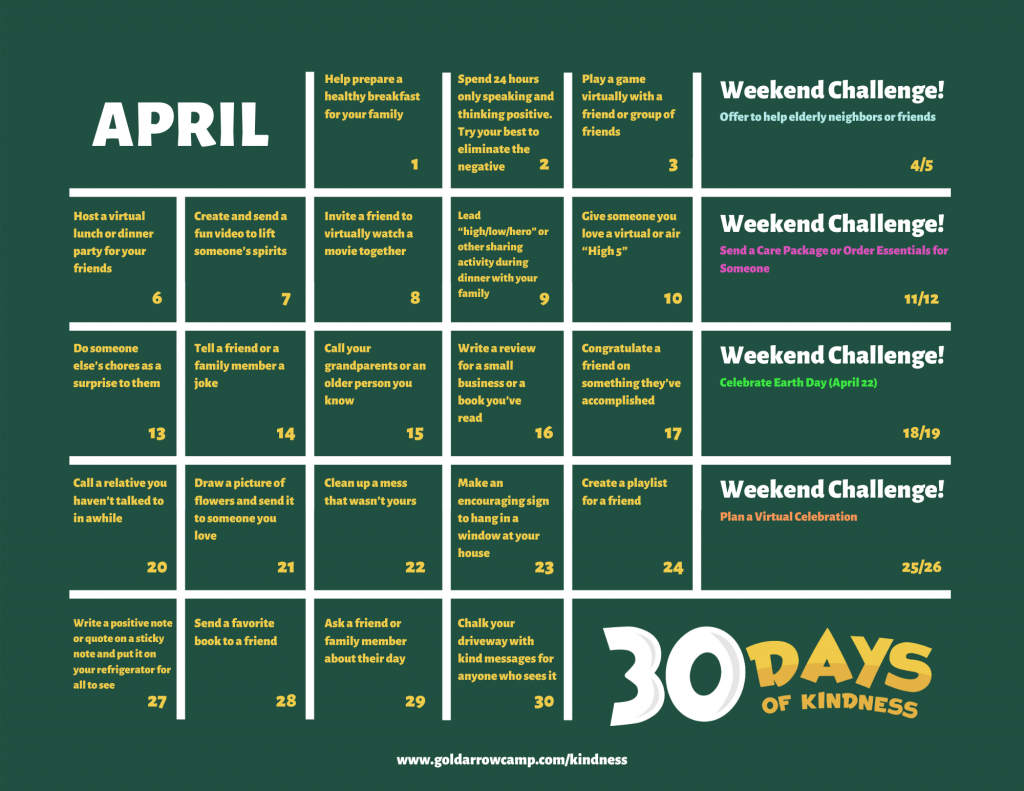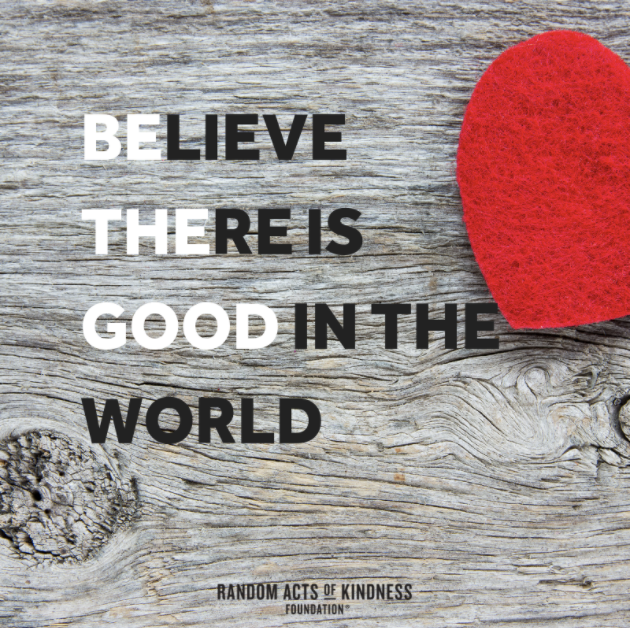Camp Kindness Day
GAC is excited to be joining camps across the country in celebrating Camp Kindness Day! For our summer theme, Better Together, we’ve been talking about ways we can be better together. After a year of being separated from loved ones and friends, it’s more important than ever to remember to be kind to one another and find ways in which we are better together.
Here’s what the American Camp Association has to say about Camp Kindness Day:
On July 20, the camp community will participate in Camp Kindness Day – an event highlighting the practice of intentional kindness that happens every day at American camps. This is an opportunity to raise awareness of the the great work that camps are doing to teach kindness in engaging, simple, repeatable, and high impact ways that live on in the daily lives of campers and staff members when they return home.
Focusing on our youth and young adults, Camp Kindness Day will help showcase the commitment of the camp community to fostering the core values of kindness, compassion, generosity and care, and integrating those values more fully into every aspect of our society. These values are already part of the fabric of the camp experience. We share the mission for our youth to be nurtured, taught, supported, and inspired to grow into our new generation of kind, compassionate, socially-minded, community-oriented citizens.
Camp Kindness Day will allow camps to incorporate into their July 20 programming fun theme-based activities and cooperative games, cool projects, and memorable moments which will celebrate the value and impact of kindness.
#GACkindness: 30 Days of Kindness
GAC is excited to be joining camps across the country in celebrating Camp Kindness Day! For our summer theme, Better Together, we’ve been talking about ways we can be better together. After a year of being separated from loved ones and friends, it’s more important than ever to remember to be kind to one another and find ways in which we are better together.
Here’s what the American Camp Association has to say about Camp Kindness Day:
On July 20, the camp community will participate in Camp Kindness Day – an event highlighting the practice of intentional kindness that happens every day at American camps. This is an opportunity to raise awareness of the the great work that camps are doing to teach kindness in engaging, simple, repeatable, and high impact ways that live on in the daily lives of campers and staff members when they return home.
Focusing on our youth and young adults, Camp Kindness Day will help showcase the commitment of the camp community to fostering the core values of kindness, compassion, generosity and care, and integrating those values more fully into every aspect of our society. These values are already part of the fabric of the camp experience. We share the mission for our youth to be nurtured, taught, supported, and inspired to grow into our new generation of kind, compassionate, socially-minded, community-oriented citizens.
Camp Kindness Day will allow camps to incorporate into their July 20 programming fun theme-based activities and cooperative games, cool projects, and memorable moments which will celebrate the value and impact of kindness.
#GACkindness
Hi Camp Families & Staff,
Since we have more time to spend together (virtually) and with our families at home this month due to all of our extracurricular activities being cancelled, we thought we could work on a challenge together. We’re calling it 30 Days of Kindness. We’ll be talking about kindness in our Afternoon Assemblies and Virtual Campfires throughout April.
Want to join us for 30 Days of Kindness in April?
All you need to do is commit to doing 30 kind acts during the month of April. You can participate as an individual or as a family!
Here are ideas of what you can do:
• Commit to doing at least ONE daily kindness (DK) each day in April. These can be small acts of kindness or big ones – an encouraging sticky note to a parent or sibling or a bigger project. You can do the same thing every day – like writing one thank you note or text each day – or you can pick any combo of different kindness acts.
• Consider doing (alone or with your family) a bigger Weekend Kindness Challenge (WKC). We’ve included suggestions on the April Kindness Calendar.
April Kindness Calendar
Here is a printable version of our April Kindness Calendar! In addition to the Kindness Calendar, you can find ideas of people to write notes of appreciation to on our printable Kindness “BINGO” board! Keep track of how you’re spreading kindness using our printable Kindness Tracker! Also, here are some printable GACspirations to keep you inspired to spread kindness!
Daily Kindness (DK)
Follow along on our April Kindness Calendar for some ideas, or create your own kindness ideas you can do from home.
How many acts of kindness can you do this month? There are 30 days in April, so if you do one kind thing each day, that’s 30 ways to make yourself and others happier this month! If you miss a day, you can always do two acts of kindness on another day to catch up. And, if you go over 30 acts, all that means is that you’re spreading even more kindness to the world, which is a good thing.
Weekend Kindness Challenges (WKC)
Since on weekends we tend to have more time, we’ve saved some more time-intensive kindness ideas for the weekends in April. These are just suggestions. You can come up with your own kindness ideas, too!
WKC #1: Offer to Help Elderly Neighbors or Friends
The Random Acts of Kindness Foundation has free printable, “Hello, Let me know if you need help” cards. Distribute them to neighbors who may need assistance and offer to get them supplies when you get your family’s.

WKC #2: Send a Care Package or Order Essentials for Someone
Order essentials to be delivered to someone who may be in need during this time. This may be someone you know personally, or a place that you know thrives off of donations. Another option is to create a care package for someone who you know is working extra hard these days like a medical professional–again, this could be someone close to home (maybe your own family member!) or someone across the country.
WKC #3: Celebrate Earth Day (April 22)
With your extra time this month, you can celebrate Earth Day indoors by going through your belongings and donating any clothes or toys in good condition. Keeping these items out of landfills is a great way to celebrate this year! Other options that you can do throughout the month include washing dishes by hand, have a zero-waste lunch day, and sort trash and recyclables. There are additional ideas at Let Grow.
WKC #4: Plan a Virtual Celebration
There are many important events that are coming up in your friends’ and family members’ lives that we don’t want to forget just because we can’t celebrate how we usually would. Pick an upcoming event such as someone’s birthday, an anniversary, or a surprise thank you celebration and start planning! One thing that you can do is contact all of the person’s loved ones and ask them to send you a video, a message, or a physical note that you can collect and give to the person all at once on their special day. You can give them guidelines such as “tell them what you love about them” or “tell them a funny memory you have with them” or you can leave it open to the sender of the message. You could also organize all of the person’s loved ones to call them at different times throughout the day and deliver their messages personally. If you had enough time to receive physical letters, you could organize them into a book or a nice box for them to keep. Alternatively, you could plan a “surprise” virtual event (via Zoom or something similar) where all of the guests knew that it was a party for the special person. You can still “theme” the event even with everyone at home. It could be fancy or a fun costume theme, the possibilities are endless! Your special person will feel so loved that their day did not get overlooked just because everyone is inside. If this feels overwhelming to you, pick another friend or family member to help you brainstorm and plan what would be best for your special person!
DOWNLOADS
For Parents: Why is Kindness Important?
Being considerate of others will take your children further in life than any college degree.
Marian Wright Edelman
Being a considerate, kind person who thinks about others is a character trait that helps children form good relationships and leads to a happier life as an adult.
What does this mean for super competitive parents who want their children to succeed at all costs, even if it means cheating and being mean to others? It could be helpful for parents to know that research has clearly shown that kind people are happier people, and happier people, in turn, are more successful in life. In jobs and in future relationships, kindness will take our children “further in life than any college degree.”
Focusing on kindness needs to be a higher priority for everyone who cares about children.
In our cut-throat, competitive culture, where assertiveness and achievement are glorified and valued, focusing on developing kindness is often overlooked.
There are anti-bullying posters and speakers at most schools, but where is the message about the powerfully positive impact of kindness?
Parents and youth development professionals, including teachers, coaches, and camp staff, know that wording things positively and telling kids what we DO want them to do is far more effective than a list of “don’ts” and “nos.” So, why hasn’t this message translated into how we teach children to treat one another?
We’re talking with children a lot about not bullying each other, but we’re not talking with them enough about what we want them to be doing instead — which is, of course, to treat each other with respect and kindness. I propose that as parents and youth development professionals we flip the “anti-bullying” message into a “pro-kindness” one.
Ways to model and practice kindness
Get kids to focus on kindnesses that they have seen by asking them to point out kind acts they have witnessed or done.
Brainstorm with kids kind things they can do for others and help them follow through. Focus on small, easy kindnesses rather than huge things.
Talk with kids about how they feel after someone has done something kind for them or after they’ve done something kind for another person.
Questions to Ask Kids to Spur Conversations about Kindness
• Share something kind they’ve seen someone else do this past week.
• What’s the kindest thing someone has ever done for you?
• What are kind things we can do for our friends? Siblings? Parents? People we don’t know?
• How do you want to be remembered by your classmates and friends?
“You can’t live a perfect day without doing something for someone who will never be able to repay you.”
— John Wooden
This topic is so important to Gold Arrow Camp and to Sunshine that she dedicated an entire chapter of her book, Happy Campers, to it: Camp Secret #8: Make it Cool to be Kind. Each chapter of Happy Campers ends with five different “Bringing Camp Home” activities to consider trying in your family.
More Kindness Ideas
Read (or listen to) Wonder by R.J. Palacio
One of GAC counselors’ favorite read-aloud books is R.J. Palacio’s Wonder. Consider reading (or listening – Audible version is free right now if you sign up for a free Audible trial) to Wonder individually or as a family read-aloud. Get some popcorn and have a family movie night to watch the movie version after you finish reading.

Do you like Pinterest? Check out Sunshine’s Kindness board.
Five Ways to Raise Kind Children, Greater Good Science Center
Being Kind Makes Kids Happy, Greater Good Science Center
The Power of Kindness, American Camp Association
Happiness Tip: Commit to Kindness (Christine Carter, Raising Happiness)



